Rosa Gonzalez of Green For All in Oakland was the facilitator. She began by talking about the talks. They’re very challenging. On the way into Joburg, she got into a conversation with a cabbie that underlined people’s lack of faith in any possible solutions. We need to build a movement that is inclusive and capable of forging viable alternatives. Our movement in the US has been focused on green jobs. We see that growing here in South Africa as well. What are grassroots strategies that are getting at issues around climate change that speak to ordinary people. Let’s go around in a circle and introduce ourselves: who are you, what do you do, and what main question do you have coming out of COP17?
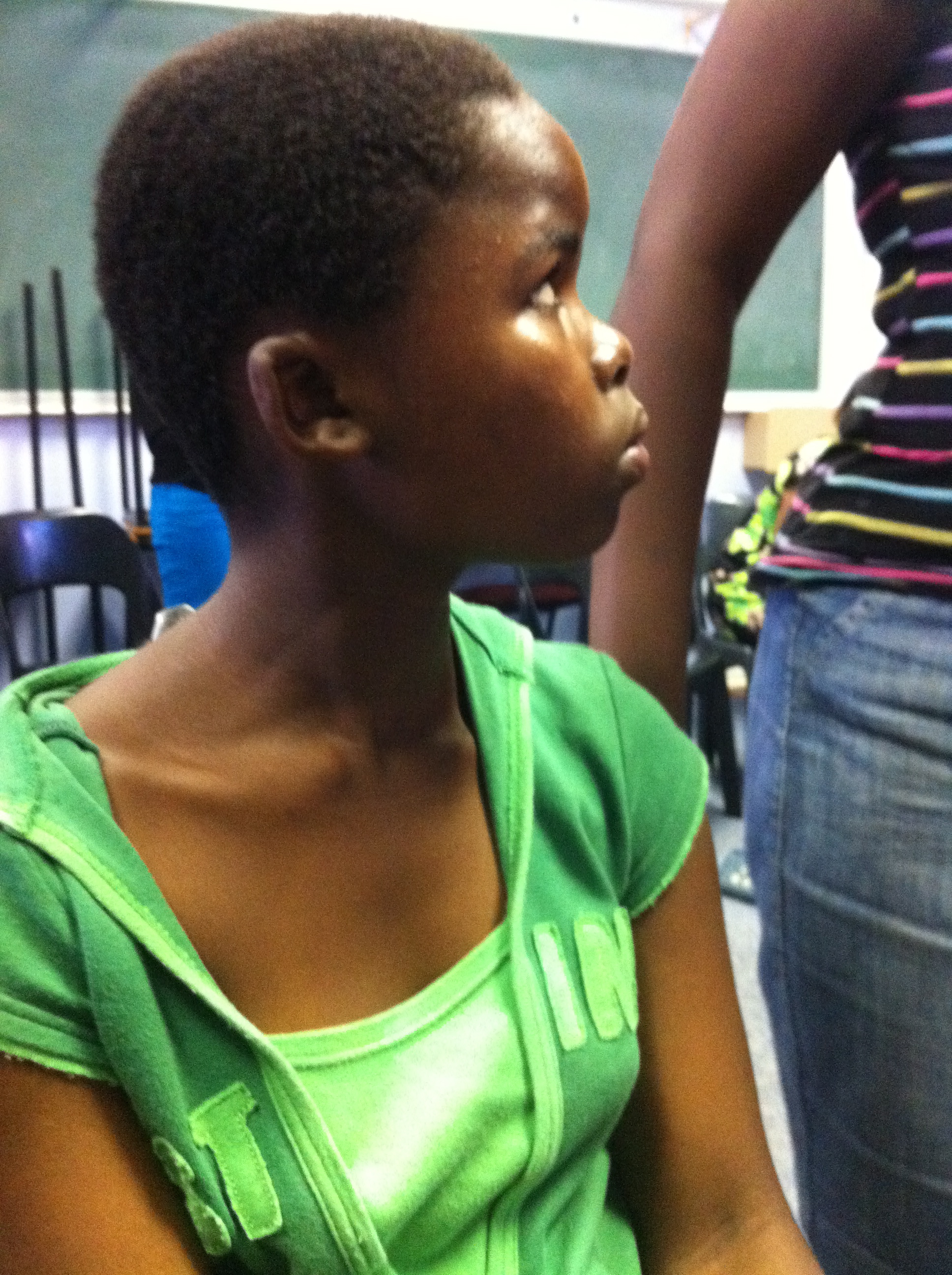 Photos are of members of the smaller workshop that I describe participating in later in the blog.
Photos are of members of the smaller workshop that I describe participating in later in the blog.
Aminha from Detroit works on a zero waste campaign. Detroit has the largest incinerator in the US, and there is no curbside recycling program. We don’t have a strong movement of waste pickers. We’ve made a lot of connections here in Durban and I see a lot of connections. How will those continue once we return to our homes.
Jameelah from NYC working at Center for Sustainable Energy at Bronx Community College. Trying to make buildings more energy efficient in NYC through training courses that are run with community organizations. How can we work outside established circles and create new allies?
Jean-Louise from Port Elizabeth, who works on permaculture. How serious are we about localization?
Mubali from MPumalanga. My organization is working on environmental impact assessment. Our main priority is to conscientize the masses. We feel that this system of carbon trading is catastrophic.
Pierre-Louis from Mtonjeni project, which works with boys and girls in Durban to teach environmental studies. Most people seem to be waiting for the green fund, but should we wait this way or rather create our own
Feemduma from Durban, who works on teaching life skills to young people. I’ve been struck by stories from other people here 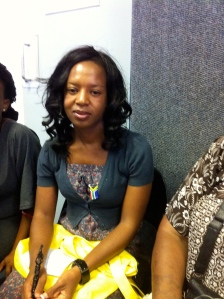 about how climate change is impacting their lives. They’ve been asking us to help them, which has been surprising to me since I didn’t think that people in the US and EU had problems around environmental issues. Even the municipalities here don’t have environmental offices – so I wonder
about how climate change is impacting their lives. They’ve been asking us to help them, which has been surprising to me since I didn’t think that people in the US and EU had problems around environmental issues. Even the municipalities here don’t have environmental offices – so I wonder
Abrahana from South Africa’s women and climate justice campaign that’s demanding that government create one million climate jobs. We’ve done research that shows that we can create: renewable energy, public transporrt, agroecology, energy efficiency in housing. I’m also involved in Timberwatch.
Ryan from Port Elizabeth Transition Network. We’re trying to get people to embrace concrete solutions to reduce their impact on the climate. My question would be how we can take what we learn here back home.
Greela Peterson, student in UNISA doing communication science. What interested me was the question of how we can go back to a world in which we take care of the environment, using natural products instead of chemicals. My question has to do with fact that young people are not educated about what’s going on in COP17. How can we educate young people around the country?
Amazile, a student here in Durban. It’s interesting to meet people from all around the world who are coming here. We’re suffering a lot from rural ignorance. Some people think that COP17 refers to the police.
Patrick from Mpumalanga. I’d like to respond to my sisters’ comments about townships. We need to fight against first and second economy, which leads some people to get development and others not to do so. For example, we have a policy called Black Empowerment, which means that only some get richer in this country. We must fight against these policies. I’m here representing communities affected by coal mining countries like Anglo-American in Mpumalanga; those companies are in our community just to steal our resources. Our communities have not benefited at all from what they’ve taken out of the ground, and we’ve been affected. I for example have tuberculosis but haven’t gotten any benefits from the mines. We need to educate people about what climate change is since many people here – elders in particular – don’t understand what’s going on, and can’t speak anything other than local language.
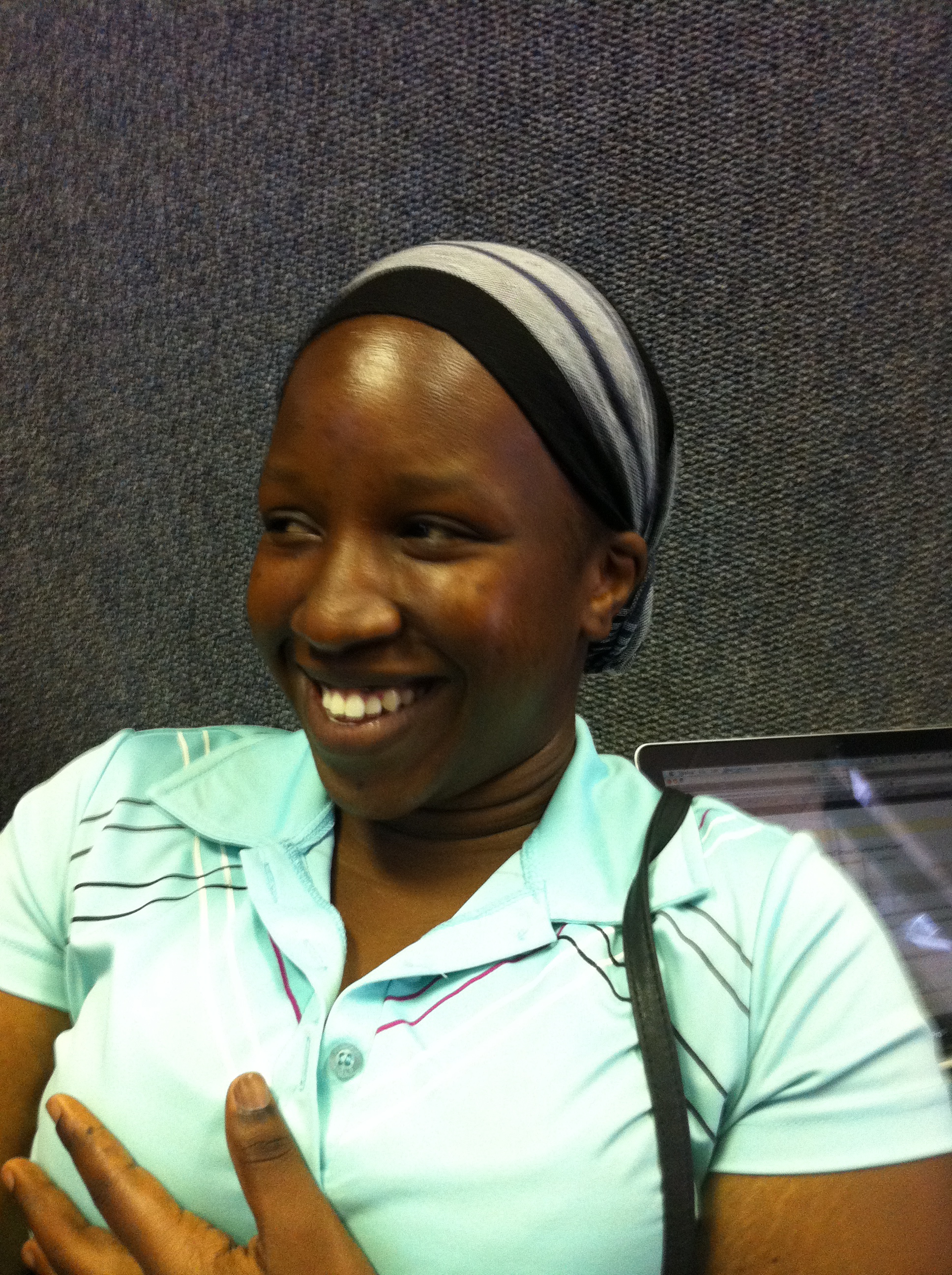 Felix from Mainz, Germany. I’ve been part of small political movements working against coal in Germany and organizing climate camps in Europe. Two questions come into my mind: are we all speaking about the same thing? Is it important that we’re united or not? And I also wonder whether we should be more radical – the march, for example, staying very much within approved route.
Felix from Mainz, Germany. I’ve been part of small political movements working against coal in Germany and organizing climate camps in Europe. Two questions come into my mind: are we all speaking about the same thing? Is it important that we’re united or not? And I also wonder whether we should be more radical – the march, for example, staying very much within approved route.
Musa working with old and young people in rural areas of South Africa. Poverty is a major problem in these areas.
Marcia Thomas of Los Angeles. Last year my organization gave a series of grants to small organizations in Africa that were working on adaptation processes. My interest in coming here has been on how the grassroots would tackle issues since I know already what the UN side is. It’s been exciting to go between the people’s space and ICC.
Verna Williams from Biowatch, which has a critical take on industrial agriculture. We believe in food sovereignty and agroecology. People in rural areas in this country practice agroecology, but government authorities here are handing out GMO seeds, which destroys the planet and hooks people into commodity cycle. Communities in rural areas have done nothing to contribute to climate change, and their lives are totally sustainable. But you can see industrial agriculture and transnationals making huge impact on climate, but they’ve got their talons hooked into politicians. No significant progressive political leadership at UN.
Philomen from Sasolburg. We’re surprised that SASOL is on UN negotiating team since they are polluting environment in our area. I work with an organization that studies mines, and we encourage people who invest in corporations to think about ethical issues. We’re encouraging communities to write their own stories about what’s going on. My organization has also been monitoring air quality issues in Vaal, which is one of pollution hot spots in South Africa.
Samson from Vaal Environmental Justice. My organization looks at how the South African government has failed to 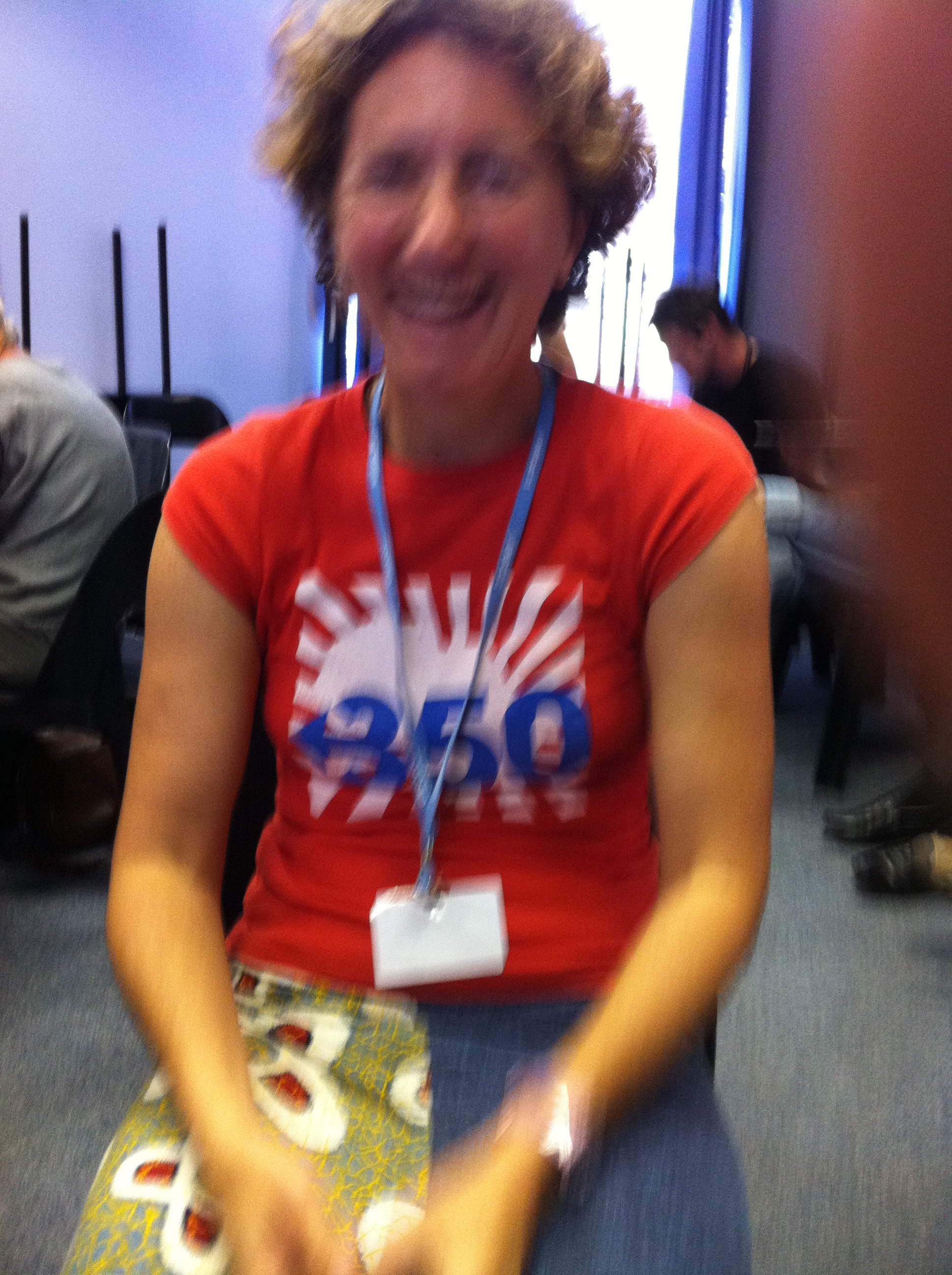 decentralization water resources over the last decade. We’re pushing Department of Mineral Resources, which issues licenses without thinking about impact on water. We also link these issues with climate change. My question is why we’re sitting in this room? I think we need a more radical approach towards the ICC. We need to send grassroots messages to the negotiators there. And the other question is what to do next?
decentralization water resources over the last decade. We’re pushing Department of Mineral Resources, which issues licenses without thinking about impact on water. We also link these issues with climate change. My question is why we’re sitting in this room? I think we need a more radical approach towards the ICC. We need to send grassroots messages to the negotiators there. And the other question is what to do next?
Julio McQueen from San Francisco, who is here as part of the Million Person Project, which has a storytelling for change project. My questions relate to the issue of maintaining contact and momentum. And, in addition, in light of the fact that COP isn’t working as it should, how can we ramp up grassroots efforts in order to meet the scale we need.
Heather of Million Person Project and 350.org. When we bring people together to tell their stories, we hear incredibly inspiring stories and we help build powerful communities. We need to build a global network of people to help one another. In this rapidly globalizing world, how will people globalize relationships and friendships?
David who comes from rural US community where land was heavily logged. In 1976 we initiated a project to restore salmon runs. Valley is now significantly reforested. Ecosystem restoration should be part of any climate jobs campaign. But problems exist outside our ability to control. Climate change, in particular, goes beyond our ability to control. Ocean currents are shifting, drought is more of a problem. We need allies, and its seems like it’s less and less likely that we’ll find them at COP.
Toni from Elokshin, representing an organization dedicated to empowering women leaders. Yesterday I went on the toxic tour and was so frustrated to see so much horrible pollution in such a beautiful place. In ICC I see huge amounts of greenwashing. I wish these big corporations could see dire circumstances we’re in. The youth where I come from are so in denial – it’s not just that the elders are keeping knowledge from us. So I’ve come here to learn more.
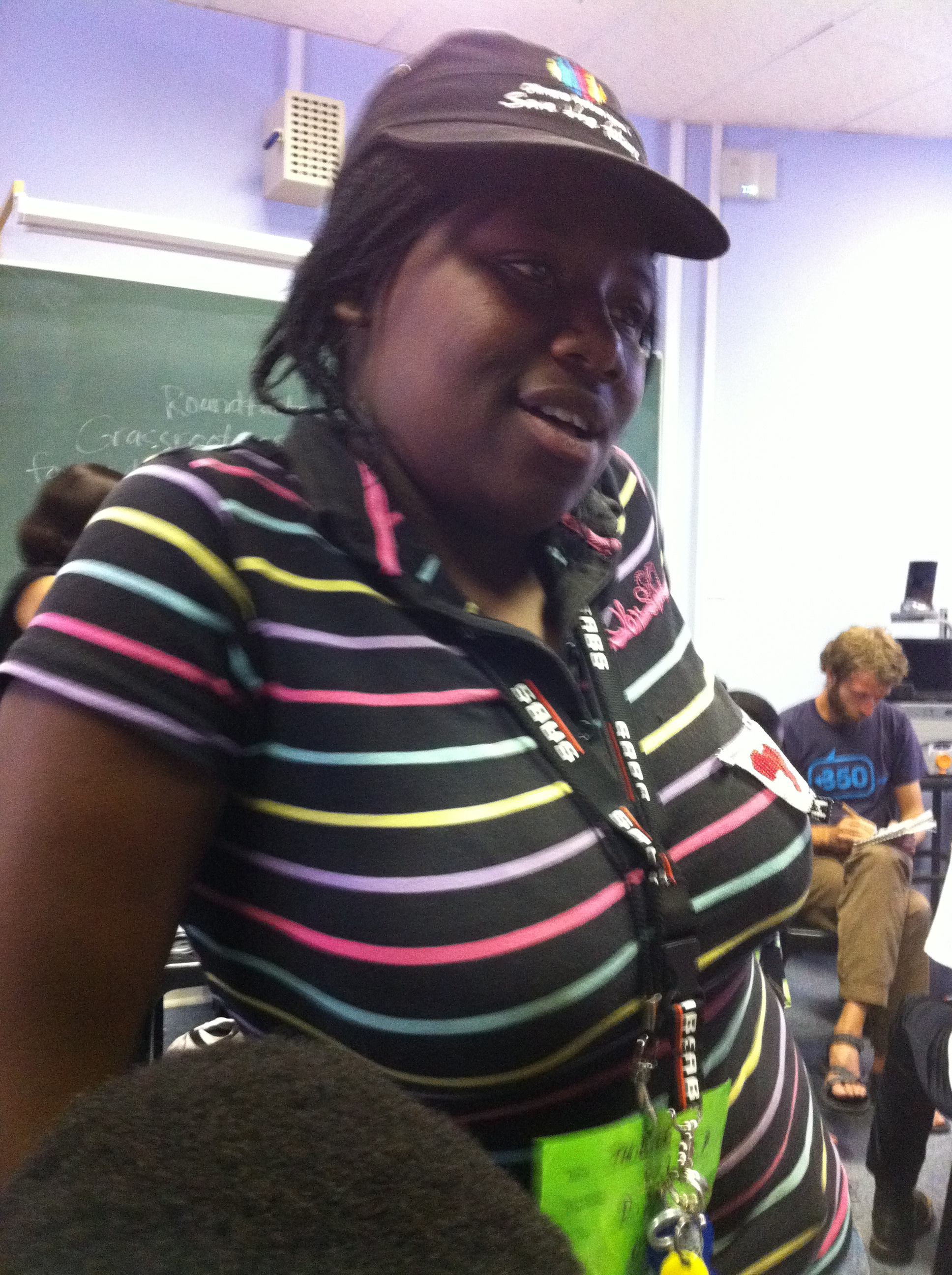 Will, from the US but living in Spain and working with 350.org. We face a huge challenge because we’re trying to create grassroots struggles and implement them at scale that’s necessary to save the planet. What we do is try to make the invisible visible by showing that we do have a movement all around the world. Once we see one another is do powerful things. How can we surprise ourselves, just at Egyptians did when they got into the street and overthrew their dictator? How to strike the balance between essential cultural shift that’s required, since so much of the world is addressing poverty through notions of “development.” How can we lift people out of poverty without giving in to development? And how can we move forward
Will, from the US but living in Spain and working with 350.org. We face a huge challenge because we’re trying to create grassroots struggles and implement them at scale that’s necessary to save the planet. What we do is try to make the invisible visible by showing that we do have a movement all around the world. Once we see one another is do powerful things. How can we surprise ourselves, just at Egyptians did when they got into the street and overthrew their dictator? How to strike the balance between essential cultural shift that’s required, since so much of the world is addressing poverty through notions of “development.” How can we lift people out of poverty without giving in to development? And how can we move forward
Nnogeni of the women’s leadership training project.
Naftali from Sassolburg. My home in the Vaal Triangle is even more polluted than south Durban. My question: can we separate nature from God? What are we going to tell our brothers and sisters when we go home from this meeting? And what are we going to tell our children?
Samantha from 350.org. For years I’ve lived with a sense of how out of balance we are. Climate change presents the opportunity of remaking our world. Our leaders are governing so badly, we have the opportunity to take control of our lives. I’m also excited by idea of wisdom of elders and intergenerational linkages.
Janet from Port Elizabeth Nelson Mandela Transition Network. Working with urban poor people in the city and looking at how to establish cooperatives so that people can control their own lives. These men don’t think about climate change; what kinds of things can we put into place which are sustainable solutions that appeal to people. Also, I have students working in places like Zimbabwe, where people are unable to survive through farming today. They’re really desperate. Our organization can be thought of as prefigurative, working with most extreme forms of poverty and finding solution.
Victor from Hungarian Youth Federation. We used to have four seasons when I was a child, but now they’ve completely vanished. We have only very hot summers and very cold winters. But people of Hungary don’t seem to be very mobilized. I’ve just heard speeches about how we need to do something; I’m interested in thinking of practical strategies that I can use to help mobilize my people.
Siri, a member of Youth for Eco-Justice. We’ve been given the task of being trained here and then going home to our countries and implementing some sort of project that addresses climate change in our home countries.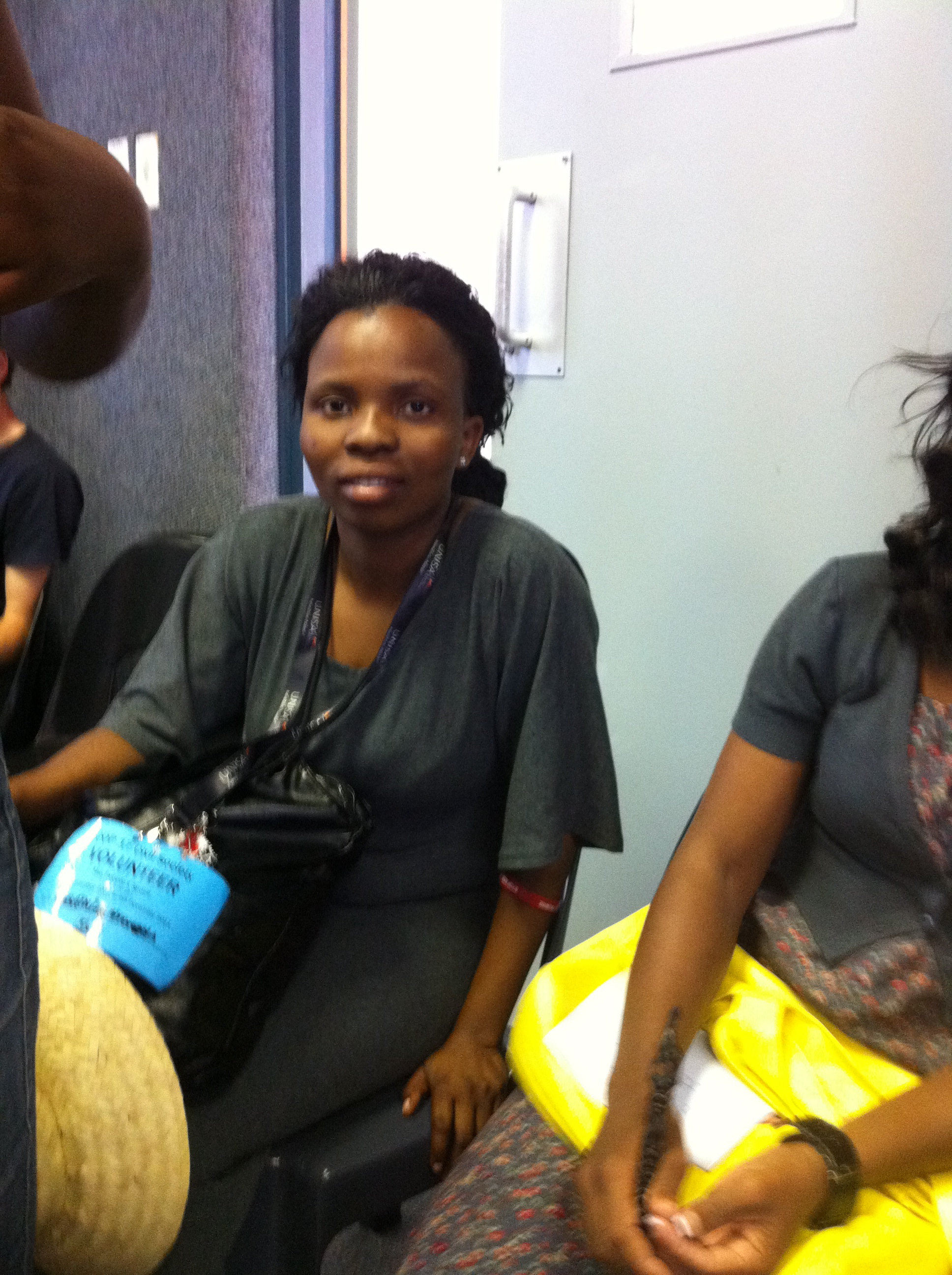
Veronica from Vaal Environmental Justice Organization. We have terrible pollution there. How do we link our movements with government so that our voices can be heard?
Npumi from Mpumalanga. We’re here to talk about air pollution.
Rosa: I’m struck by the similarities around the room. Let’s divide ourselves up into four groups. Also, the sense that we need a call to action – how do we transform talk into action? Anyone who wants to can speak directly on camera and transmit their voices to the rest of the world. 1) What innovative solutions can we come up with; 2) How do we engage affected communities, developing strategies that educate people and build leadership?; 3) How do we bring conversations back to policy makers, in general and over last two days of the COP17 conference?; 4) Next steps – how do we globalize our relationships, bring this work back home and build the movement?
I’m in group #2, which is focusing on education. I’m putting people’s interventions in bullet points:
- How can we talk across our differences since we inhabit such different communities?
- There are significant commonalities because people even in the US are affected directly by climate change.
- Also, it’s not just people in the developed world who are thinking exclusively of immediate jobs rather than issue of climate change.
- Our education system has got to be balanced; you should be studying something that’s not just vocational.
- Coming from a rural community, I find that people have direct experience of climate change, although we don’t always have the language to understand it. Our elders sometimes tell us that the gods are punishing us and we need to go and pray. They don’t know that it is we who are punishing ourselves. I need a language to speak to them.
- In my organization, we play a game called “the haves and the have-nots” in which one group of people have all the resources and the others don’t have any. The outcomes are often different – sometimes people go and ask politicians for help, sometimes they organize themselves to demand change.
- What brought you all into this struggle?
- In my community in Mpumalanga, people are dying from the pollution created by steel companies and mines – TB, cyanosis, etc. And when open-cast coal companies do blasting, it fills the air. So we’ve started an organization, but we face the problem that air quality officers refuse to check. What resources do you need? We need to tell people that they have to stand up to the companies. People are afraid of losing their jobs, so it’s hard to get them to stand up to the corporations.
- During the day, the mining companies in my community switch off their machines because they don’t want bad publicity, but at night they turn them back on and the air is totally polluted. We put a bucket of water in front of a hospital at night and the next day it was totally polluted. Acids and all sorts of other chemicals.
- The mine owners bribe the municipality to stay quiet and to tell the community that their protests will make their husbands lose their jobs.
- Yes, the same thing happened in Detroit. The local politicians took bribes, and then the FBI came in and arrested him later.
- Now they’re introducing a secrecy bill that will stop us from getting information.
- I’ve been arrested twice for trying to tell community about air pollution.
- The government should be advocating for us not against us.
- Our organization starts educating kids young. We do an after school program in which we take them around and show them how bad pollution is.
- We’ve got 6 coal-fired power stations, and they’re opening others. And Zuma’s family members are on the boards of the mining companies, so they’re not going to do anything.
- We’ve been trying to get the government to move the hospital.
- We need to get musicians and other entertainers to get our message out. Song available on radiowave.350.org
Presentation from group 1: innovative solutions to meet community needs
- People need to understand where they come from. And young people need to understand this issue. There has to be a way to educate people. There also has to be an interaction with the government so that our voices can be heard. And we also talked about the need to speak to the business community rather than to isolate ourselves. Also, elderly people need to be involved in these discussions. Also, we should practice common resource management of resources in a particular watershed, starting with food and then going to energy, biodiversity, etc. The basis is to localize and give people the power to use their local resources. And people need to understand that they need to fight for their rights. Need to look at worker cooperatives.
Group #3: What can be done now to shift COP17
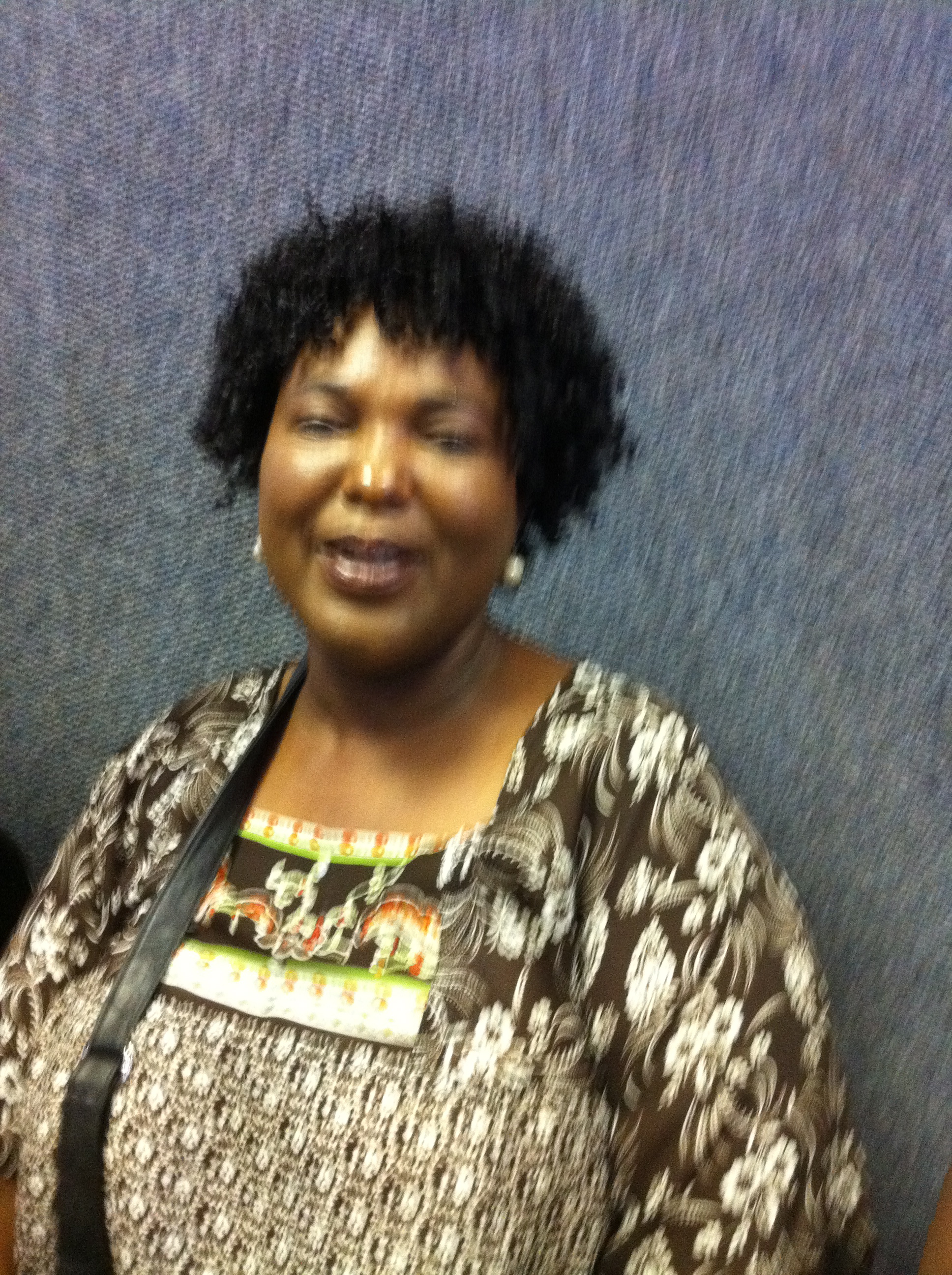 There are many organizations on the inside that are going to be ramping up their levels of protest on the inside. Our goal is to support African countries and other vulnerable countries who are resisting powerful countries. We’re also thinking about getting as many people involved in the speaker’s corner, particularly on Friday, so that the story of our movement can be conveyed. We need to spread the word to our movements that people need to turn up at speaker’s corner on Friday. Also, we need to think about how to link up people on the inside with those on the outside. Also, concert at Botanical Gardens tomorrow night by Freshly Ground that we’re reaching out to.
There are many organizations on the inside that are going to be ramping up their levels of protest on the inside. Our goal is to support African countries and other vulnerable countries who are resisting powerful countries. We’re also thinking about getting as many people involved in the speaker’s corner, particularly on Friday, so that the story of our movement can be conveyed. We need to spread the word to our movements that people need to turn up at speaker’s corner on Friday. Also, we need to think about how to link up people on the inside with those on the outside. Also, concert at Botanical Gardens tomorrow night by Freshly Ground that we’re reaching out to.
Group 4: How do we continue to build the momentum of this movement beyond COP17
- We should all be going home and doing report backs in our local networks. Another thing is that we shouldn’t just think of ourselves as fighting against COP, we should also be thinking about positive paths forward. In addition, we should be thinking about networking and staying connected in order to reinforce one another’s work. We also share stories about people’s successes. We also need to draw people’s attention to capitalism and its infinite growth model as unsustainable. We need to put one another’s stories up on our blogs or through our networks. Each person should take back one story from here and let other people know. It’s also critical that we be aware of the kind of language we’re using so that people can understand where we’re coming from.